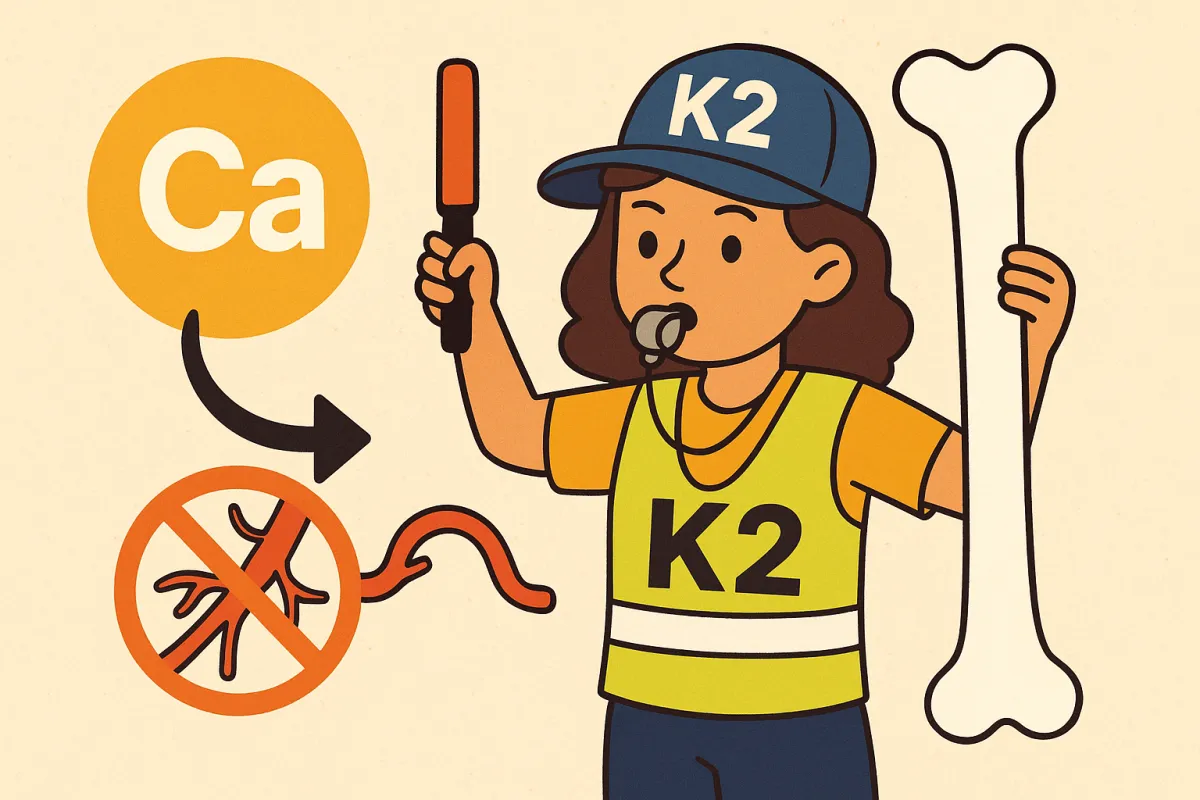
Why Vitamin K2 Is the Missing Link in Bone Health
You’ve probably heard of calcium and vitamin D for strong bones. But there’s another key nutrient that often gets overlooked — and without it, all that calcium might end up in the wrong place.
That nutrient is vitamin K2.
What Does Vitamin K2 Actually Do?
K2 acts like a traffic director for calcium. It helps make sure the calcium you absorb ends up in your bones — not in soft tissues like your arteries.
It does this by activating proteins like:
Osteocalcin, which binds calcium into bone
Matrix Gla Protein (MGP), which prevents calcium from building up in blood vessels
Without enough K2, calcium can circulate without direction, increasing the risk of both weak bones and arterial calcification over time.
How Is K2 Different from K1?
Many people assume they’re getting enough K from leafy greens — and they’re partly right.
Vitamin K1 (phylloquinone) is found in green vegetables and helps with blood clotting.
Vitamin K2 (menaquinone) plays a different role — mainly in bone and heart health.
K2 is harder to get from a typical Western diet. It’s found mainly in:
Natto (a fermented soybean food popular in Japan)
Aged cheeses
Some fermented meats
K2 supplements (often labeled as MK-4 or MK-7)
Most people don’t eat natto — and while cheese helps, it’s hard to get optimal levels through food alone.
Why K2 Is So Important for Bone Density
Vitamin K2 helps deposit calcium into your bones, especially when used alongside vitamin D3.
🧪 In a 2013 study published in Osteoporosis International, women who took both vitamin K2 and D3 had significantly better maintenance of lumbar spine bone density over three years compared to those taking D3 alone.¹
Other studies suggest that K2 may help reduce fracture risk and improve bone strength, especially in older adults.
Should You Supplement?
Because K2 is so hard to get from food — and because it plays such a crucial role in directing calcium to the right place — many bone health practitioners recommend supplementing with K2, especially if you’re already taking calcium and D3.
Look for:
MK-7 (longer-acting) or MK-4 (shorter half-life, used in some clinical trials)
A dose of around 90–180 mcg per day, unless your practitioner recommends more
A formula that includes K2 alongside D3 for synergistic benefit
K2 is generally safe and well tolerated. If you're on blood thinners, speak with your doctor first, as K2 can affect clotting.
💡 Tip: Vitamin K2 is fat-soluble, so it’s best taken with a meal that includes some dietary fat. The exact time of day isn’t critical — just focus on taking it consistently.
Final Thought
If calcium is the building material and D3 is the gatekeeper, then K2 is the foreman who makes sure everything ends up in the right place.
It doesn’t just protect your bones — it helps protect your arteries, too. And if you're already working on bone health, adding K2 might be the missing piece to make everything else work better.
Reference
Knapen, M. H., et al. (2013). Three-year low-dose menaquinone-7 supplementation helps decrease bone loss in healthy postmenopausal women. Osteoporosis International, 24(9), 2499–2507.
